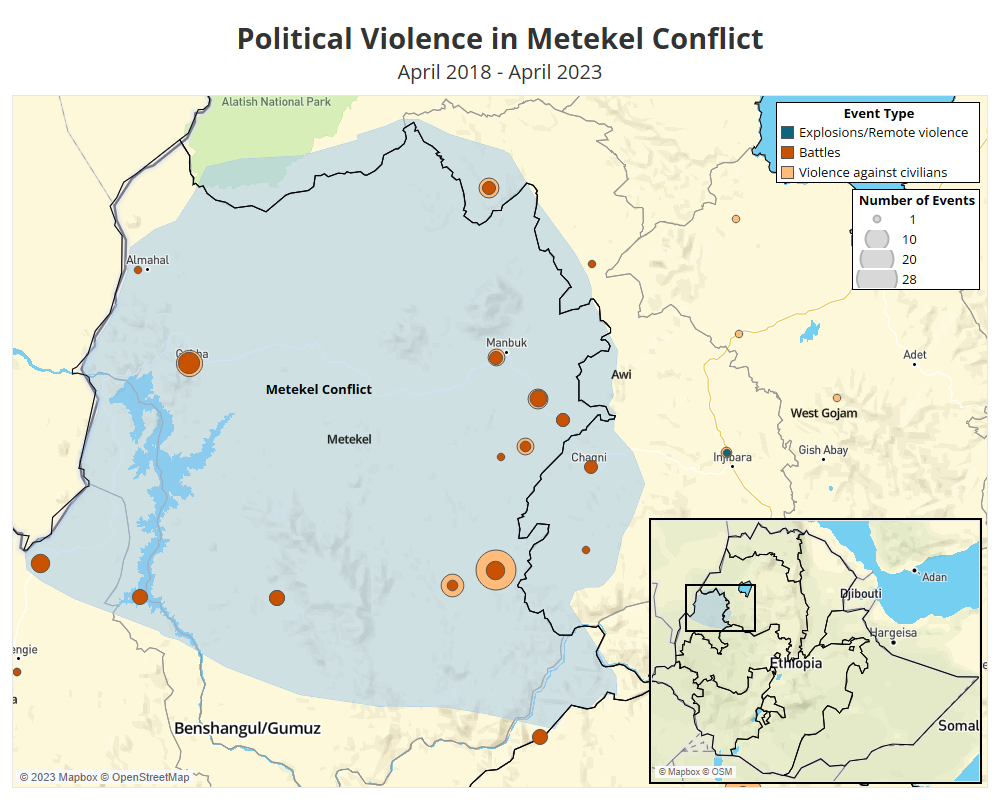Official sources have not identified the perpetrators of the violence, although they are likely made up of Gumuz ethnic militias who may be associated with more officially organized ethno-nationalist movements like the Gumuz Liberation Front (for more, see EPO Weekly, 5-11 March 2022). The local population sometimes blame factions of the Oromo Liberation Front (OLF) which is identified as OLF_Shane as being behind the killings, which the latter denies. Some OLF leaders also believe that splinter groups that once belonged to the OLF could be responsible.1 Government sources have accused “anti-peace forces” which have links with Sudan and the Tigray People’s Liberation Front (TPLF) to have perpetrated the violence.2
The conflict in Metekel has deep roots. The area is inhabited by Gumuz, Shinasha, Amhara, Oromo, Agew, and other ethnic groups. The Gumuz and Shinasha are identified as ‘Indigenous’ ethnic groups, while ethnic Amharas who resettled from the neighboring Amhara region into the fertile lands in Benshangul/Gumuz region have been labeled as ‘settlers’ – triggering land conflicts between the two groups. This issue was exacerbated by the ethnic-based politics of the Ethiopian People’s Revolutionary Democratic Front, which came to power in 1991 and designated ethnic Gumuz as the political rulers in the area. This effectively excluded ethnic Amharas (and other settlers) from political representation and exposed them to attacks by ethnic-based militias and a lack of proper government protection.3
In the face of increasing fatalities as a result of attacks on Amhara civilians during 2020 and 2021, Amhara authorities began to demand that additional actions be taken. In December 2020, the commissioner of the Amhara regional state police requested that the responsibility for solving the crisis in Benshangul/Gumuz region be granted to his forces, or that the federal government intervene.4 Officials of Benshangul/Gumuz region reacted to these requests by labeling them as “repeated threats of intimidation.”5
In January 2021, the federal government declared a state of emergency in the Metekel zone and federal troops took control of security in the area.6 This official transfer of security responsibility represents a formal intervention by multiple factions of the federal government into the regional affairs of Benshangul/Gumuz region. On the one hand, this satisfied the demands of officials from the neighboring Amhara region without exposing the Metekel zone to the complications that would have occurred had the Amhara region been involved directly. On the other hand, it exposed ethnic Gumuz communities to a heavy crackdown by the Ethiopian armed forces, resulting in alleged massacres of civilians by federal troops and the dismissal of political leaders.7
The government has made enormous efforts to bring peace to the Metekel zone, with what appears to have had varying amounts of success. The army has also implemented the training of communal militias8 and taken steps to reshape the police into a multi-ethnic force.9 The regional government is using traditional elders to bring sustainable peace to the area. For instance, in June 2022, a traditional peace and reconciliation ceremony was held in Wemebera woreda in Metekel zone. Selected elders from 11 kebeles of Wemebera woreda came together for the ceremony.10 Further, following the government’s call to surrender peacefully, various members of different armed groups decided to disarm peacefully. In August 2022, around 246 militants peacefully surrendered to the Metekel zone command post in Dangur woreda.11 On 3 May 2023, 73 members of a Gumuz armed group which were active in Kota Kebele in Dangur woreda in Meteke zone accepted the government’s call to resolve their differences through negotiation,’ and returned to Gilgel Belles town with their weapons.


